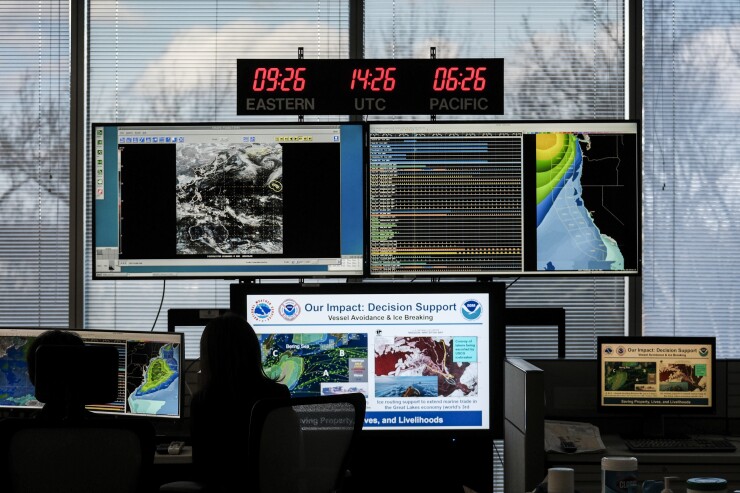(Bloomberg) --The email arrived in US government workers' inboxes just after 1 a.m. East Coast time on Friday, with the subject line "IMPORTANT CLARIFICATION - URGENT ACTION."
The message went to some staff members at the National Oceanic and Atmospheric Administration, or NOAA, the scientific agency best known for providing daily weather forecasts through its National Weather Service. It capped a tumultuous 36-hour period during which the future of the organization's international collaborations hung in limbo.
Earlier this week, NOAA scientists and staff were told to log and clear all international contacts and communication, according to internal communications seen by Bloomberg News. Some meetings with overseas counterparts were put on hold pending review and approval. Confusion reigned over how workers might troubleshoot in the case of technical glitches.
By Friday, that early morning email indicated the orders concerning global interactions had been relaxed for some employees, at least for the next several weeks.
NOAA didn't provide a comment Friday.
The agency, an arm of the US Department of Commerce, routinely cooperates with agencies around the world, from the exchange of satellite data to the coordination of aircraft that track
"Weather does not respect political boundaries," said Daniel Swain, a climate scientist at the University of California, Los Angeles, who watched the happenings at NOAA from the outside. "It is not possible to predict the weather in the United States without cooperation from other parts of the world."
International cooperation has been key to making the US a global superpower in weather forecasting. The Friday email indicated that for some, regular meetings and communication related to NOAA's scientific work could still go forward, without the need for prior approval. But concern is still gripping employees as the situation underscores the pattern of chaos and quick reversals from a Trump administration making sweeping changes to the federal government.
Read More:
Representative Jared Huffman of California said in a
And at the same time, industry watchers say NOAA and the weather service remain under the shadow cast by the influential Project 2025 blueprint, which called for cuts and even the dismantling of some of the agency's missions.
"We all have constituents in our districts who will suffer if NOAA's work is halted," Huffman, the
Craig McLean, who served as the agency's acting chief scientist during the first Trump presidency before
"It's a circus," McLean said. "If Trump's goal is to destabilize, humiliate and embarrass the loyal people who have chosen to work for their country and federal government, he is succeeding."
Waves of Upheaval
NOAA employs more than 12,000 people across an array of laboratories and forecasting offices nationwide, watching everything from fish supplies in the ocean to the atmosphere of the sun. The agency's research and observational data are the bones that support and protect billions of dollars of global markets, industry and real estate. It even has an unarmed uniformed service of about 330 officers to fly its planes and sail its ships.
Read More:
The muddled direction on foreign contacts capped a chaotic week at the agency, as directives kicked in to implement Trump's executive orders for changes to the federal workforce. Several NOAA websites supporting key data sets flickered on and off.
The agency attributed those disruptions to scheduled maintenance, but it still provoked anxiety among outside observers, who noted the
So much happened in the course of the week that even the nomination of Neil Jacobs, an atmospheric scientist, to head NOAA has almost been lost in the noise.
Read More:
Jacobs is widely seen as qualified for the job in terms of scientific credentials but is marred inside NOAA for his involvement in the "Sharpiegate" controversy, when Trump in his first term showed reporters a National Hurricane Center map seemingly altered with a marker to bolster his claims that a storm was on track to hit Alabama.
Uncertain Outlook
NOAA's forecasters publicly contradicted Trump, prompting the agency to issue a statement that backed his claims and appeared critical of the local weather staff.
McLean, the former NOAA chief scientist, was removed from that post after filing an ethics complaint against Jacobs and pressing NOAA's political appointees to review the agency's scientific integrity policy. Investigators concluded that Jacobs
Howard Lutnick, Trump's nominee for Commerce Secretary,
"We can deliver the product less expensively — dramatically less expensively," Lutnick said. "But the outcome of delivering those services should not be changed."
Scientists and activists alike have widely criticized proposals to privatize weather forecasting, arguing that anyone who can't afford a commercial alternative could lose access to life-saving information.
NOAA's data — which it now supplies to the public for free — powers weather and climate models used across the insurance industry, as well as the banking and finance sectors.
"It should be us feeling the gut-twisting worry," said Jennifer Francis, a Woodwell Climate Research Center climate scientist. "If we lose NOAA's services, we lose lives, property, and billions of dollars."
To contact the authors of this story:
Lauren Rosenthal in New York at
Brian K Sullivan in Boston at






